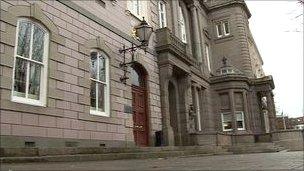A guide to the States of Jersey
- Published

States members meet at the building in the Royal Square in St Helier
The States of Jersey is responsible for the governance of the biggest of the Channel Islands.
It is the island's parliament and is currently made up of 53 voting members, external and four members without voting rights.
The members without voting rights include the Bailiff, who acts as speaker, the Attorney General, the Solicitor General and the Dean.
Voting members are split into three officers of senator, constable and deputy.
There are currently 12 senators in the States, elected for a six-year term with an island-wide mandate.
Senators are elected in groups of six with half elected every three years.
There are 29 deputies, who are elected by smaller constituencies, with some having more than one representative depending on the population in the area.
Constables are ex officio members, they have a seat in the house by virtue of being elected constable, but were not directly elected to the States.
There are 12 constables, one for each of the 12 parishes of Jersey and they are considered the 'father' of their parish.
Constables and deputies are both currently elected with a three year term of office.
The States of Jersey is made up of a council of ministers, led by a Chief Minister elected by all States members in a secret ballot.
The council of ministers, external is also elected by all States members in a secret ballot with the chief minister nominating one person for each role.
Members are then able to stand against the chief minister's nomination.
There are also a number of assistant ministers within each department who have special responsibility for certain areas of government.
The Queen is the head of state in the island and is represented by the Lieutenant-Governor.
The Lieutenant-Governor is appointed by the Queen for a period of five years to be her personal representative and impartial adviser.
Jersey, like the other Channel Islands, external, has always been self-governing and is a possession of the British Crown, which is administered through the office of the Privy Council.
Constitutional custom means the Crown does not interfere in island politics, unless it is felt some vital constitutional change is necessary, but all changes in law must go to the Privy Council for approval.
The United Kingdom looks after the Channel Islands' foreign affairs, defence and association with the European Union, which the islands are not members of.